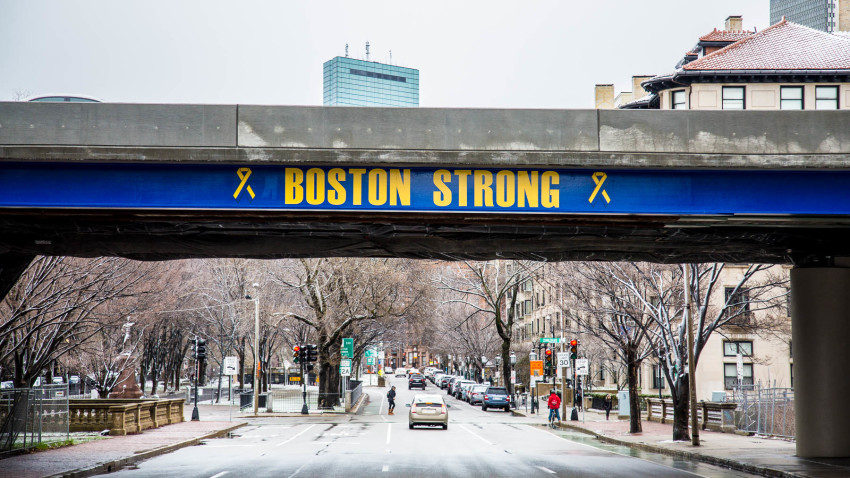
On April 16, 2016, I turned left on Commonwealth Avenue. One foot trotting past the other, I glanced up. Above me, a freshly painted banner arched across the light grey sky on the Bowker Overpass, reading “BOSTON STRONG.” I smiled, and got a little kick in my step.
Along with several thousand other runners, I was about halfway done with the Boston Athletic Association (BAA) annual 5k road race in downtown Boston. In just two days, I would be in precisely this same spot, nearly finished with the 120th Boston Marathon. The Boston Marathon is the BAAs most well-known and celebrated race, woven into the fabric of Boston’s hometown history since its inception in 1897. It would be my first full marathon, and my nerves were on full force.
A long road had brought me here. Physically, training hadn’t gone as planned—I had drawn up the iconic marathon training calendar, but a near-miss accident landed me in x-rays, MRIs, physical therapy, and a cortisone injection. Running wasn’t even an option in the two months preceding the race. I was able to keep up cardio training with swimming and biking, but even in the middle of this pre-marathon 5k, running still felt uneasy.
Much of the training experience wasn’t physical, though—as a charity runner, much of my time was spent fundraising. The Boston Marathon allows entrants through two key avenues: qualifying at another race (then entering a lottery), or being accepted as an official charity runner. Aiming for the latter avenue, I was accepted to the Red Cross’ team, whose donations support life-saving products, disaster relief, service to the military, and international aid.
The Red Cross is just one of many charities that participates in the Boston Marathon with official teams. Some of the largest teams are local medical centers such as Dana Farber, Boston Children’s Hospital, BMC, and Mass General, among others. More specialized medical centers include the Alzheimer’s Association, the Leukemia and Lymphoma Society, and the Joslin Diabetes Center. Several teams sprouted following the 2013 marathon bombings, such as MR8, and further efforts include the Special Olympics and Horizons for Homeless Children. The list keeps going—currently upwards of 34 teams—and grows each year.
The magnitude of impact these charities have seems endless. The BAA Official Charity program has raised over $200 million since 1989, and over $14 million this year alone. The donations support thousands of efforts and several stories have stuck with me. When Hurricane Harvey paralyzed several states last fall, the Red Cross provided financial assistance to over 575,000 households, and served over 4.5 million meals. When Jim Ewing, an avid rock climber, fell 50 feet off a cliff, Brigham & Women’s Hospital’s Stepping Strong Center for Trauma Innovation stepped in to develop an innovative amputation process, with a prosthetic designed to allow Jim to control it without seeing it. Today, you can find Jim with his prosthetic rock climbing in local gyms. In 2013, Jimmy Blake, a retired local MBTA employee, was found by his wife collapsed on the bathroom floor. He was rushed to BMC’s Trauma Center, where he underwent a number of tests that identified a fracture between the cervical vertebrae in his neck. The outlook for regaining bodily strength was grim. As Jimmy put it, “I wasn’t very hopeful. I didn’t have a good outlook. Then one day my daughter came into my hospital room, held my hand and said, ‘Dad you are going to walk me down the aisle at my wedding.’ That was all I needed to hear to get motivated.” BMC’s charity efforts supported Jimmy through a challenging nine months away from home, but paid off on November 5th, 2016, when Jimmy walked his daughter down the aisle.
This funding is hard fought; charity runners send hundreds of emails, letters, and texts, and host a variety of wacky events—from burrito-rolling to game nights and raffles. My roommates introduced a fundraising game where dinner guests bet on three pre-selected foods (pickled peppers, salmon jerky, and passionfruit), and whichever was voted the winner with the most donations, I, a notoriously picky eater, had to eat. The event raised $3,000, and—spoiler alert, for anyone considering such a fundraiser—I had to eat all three foods. By marathon weekend, the Red Cross team had raised nearly $400,000 between 60 runners—all through the kindness and generosity of others.
As I jogged under the overpass, the freshly painted banner fell behind me over endless thumps of neon sneakers. I thought about the journey. The 90’s pop music playing in the hospital over the booms of an MRI. The 7:00AM gear-up, watching my parents—two BWH Trauma Center charity runners—adoringly greet every single runner who walked in the door. The swallowing hug that came in exchange for a bag of potatoes at the Red Cross food bank. The high-fives from fellow runners on the infamous Heartbreak Hill during my first long run. All the pieces were coming together. In just two days, the sun would rise over the sapphire blue starting line in Hopkinton, and I would be fortunate enough to have one of the most heartwarming and enchanting days of my life.
Since that weekend, I’ve run under that same overpass countless times. I always get a kick in my step. I think that that is what everyone at the Boston Marathon is trying to do—give someone else a kick in their step. The kind of kick Boston needed following the 2013 bombings, or the kick Jimmy needed when he rose to walk his daughter down the aisle—no cane, no walker. The Boston Marathon and its charity program aspire to celebrate the city’s generosity, love, and compassion. Looking forward to my fourth marathon this spring, I cannot wait to smile again under that banner. I am humbled to be a part of this program and forever proud to support the city in its mission to make other’s lives better—one kick-in-the-step at a time.

Marissa Petersile (HBS ’19) worked as a transmission planning engineer at National Grid. She graduated from Boston University with a bachelors in Electrical Engineering and continues to support a number of organizations, including IEEE PES Women in Power and the Boston Marathon Official Charity Program (www.bit.ly/marissa2018).


